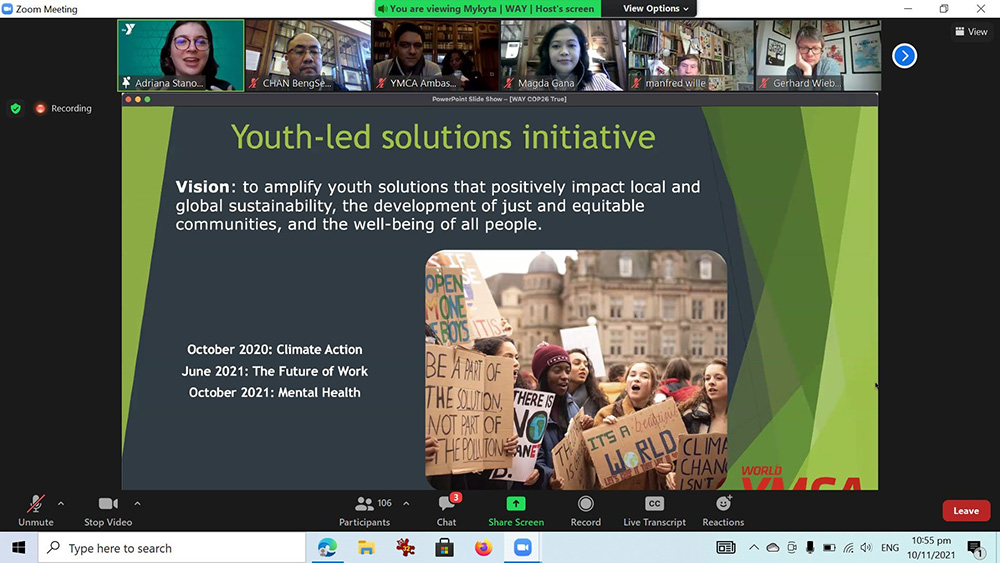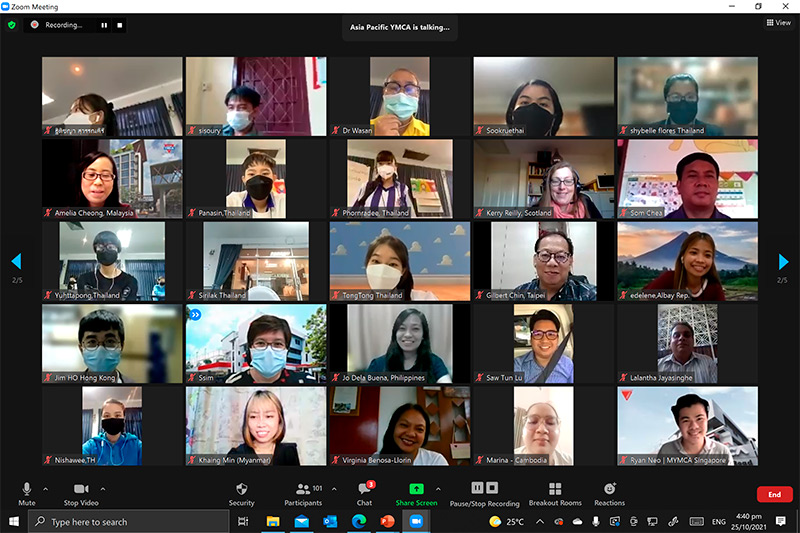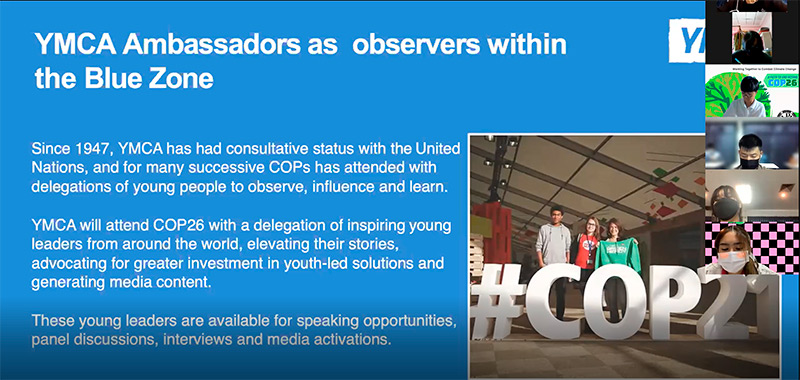Environment & Climate Change
APAY @ COP26 – A Reflection
Last Updated (Friday, 03 December 2021 16:26)

The United Kingdom hosted the 26th UN Climate Change Conference of the Parties (COP26) in Glasgow on 31 October – 13 November 2021. The COP26 Summit brought parties together to accelerate action towards the goals of the Paris Agreement and the UN Framework Convention on Climate Change. YMCA, which has ECOSOC consultative status with the UN, attended COP26 with a delegation of 18 young YMCA ambassadors worldwide.
Travel restrictions and availability of vaccinations for young people proved a big challenge for the Asia Pacific region. Except for a few countries in the NE Asia and Pacific region, all countries in AP were on the red list of UK immigration, which meant a 10-day quarantine upon arrival in the UK. Coupled with that, many young people within our region are still waiting to be vaccinated against COVID-19. Fortunately, the red list was removed at the last moment, and we were able to send Magda Gana, Makati YMCA, as our only youth YMCA Ambassador for COP26. She registered for an official badge for the 2nd week of COP26 (8-12 November 2021). Magda participated actively in Glasgow and made up for our small representation. Magda moderated the Global Online Briefing on COP26 and was interviewed by several media organisations. Magda was a member of the design committee for World YMCA’s Youth-Led Solutions Initiative.
Through the various activities and media publicity, we highlighted the voices, actions and commitment of young people in the YMCA combating climate change. A few selected youth-led initiatives were shown in the film premiere, and several outspoken youth interviewed by the global media were present at COP26. Some were fortunate to meet with and have short discussions with Party Members from their respective countries and including John Kerry from the USA. This was an excellent opportunity for the young people to challenge negotiators at COP26 to consider seriously the impact of their decisions on the earth that future generations will inherit.
The APAY and the Community of Impact on Climate Change were tasked to draft the strategy and roadmap for YMCA to increase our contributions and have higher visibility at COP-26. The two other major contributions of the APAY to the COP26 activities in Glasgow were:
i) The online Climate Change Briefing during the COP26 for the global YMCA community was conceived and organised by the APAY.
ii) APAY also helped draft the Policy Framework “COP26 and YMCA’s commitment to combating climate change - A Green New Deal for the global YMCA Movement,” shared during the online briefing.
Statement - Today is the time; today is our Future!
Last Updated (Tuesday, 02 November 2021 15:56)
Today is the time; today is our Future!
APAY Green Ambassadors Demand Urgent Climate Action
Green Ambassador’s Training; 25-29 October 2021
Context
The physical science behind the Intergovernmental Panel on Climate Change (IPCC) report indicates that due to carbon emission, the global warming is expected to surpass 1.5°C above pre-industrial levels shortly after 2030. Since 1990, the IPCC has released a series of comprehensive assessments on the state of the earth's climate confirming that dangerous human-induced climate change is already affecting many weather and climate extremes in every region across the globe. The latest IPCC report issued in August 2021 reinforced all the most urgent warnings that have emerged from the past 30 to 40 years of climate science. These environmental risks are echoed by the participants of the Green Ambassador’s Training held on 25-29 October 2021 as they experienced in their respective community sea level rise, extreme weather events, such as frequent super typhoons, droughts and floods, limited water supply, loss, and extinction of marine species, among others.
On November 1-13, 2021, the Conference of Parties (COP) will hold its 26th meeting, thus named COP26, in Glasgow, Scotland. It is the 26th year that governments, NGOs, trade unions, businesses, and everyone else with any interest in climate change meets with the same agenda from which nations have failed to act accordingly. The urgency to tackle the climate emergency is now. The long-lasting changes in our climate system due to global warming will have irreversible consequences if urgent action is not taken. Today is the time to act because what we do today determines our future!
Mission Imperative
While APAY acknowledges the initiatives taken by the UN Framework on Climate Change Convention (UNFCCC) and IPCC in raising the awareness on climate change, the commitment on addressing the crisis is embodied in Challenge 21, the contemporary mission statement of YMCA, which states that each YMCA are called to ‘defend God’s creation against all that would destroy it and preserve and protect earth’s resources for the coming generations’. Thus, we, the 80 participants of the Green Ambassador’s Training from Cambodia, Hong Kong, Laos, Myanmar, Philippines, Singapore, Sri Lanka and Thailand urge the World YMCA to adopt the zero net carbon by 2030 as necessary to achieve maximum warming of 1.5C. Setting this significant high standard affirms YMCA’s care for the ecology of the planet, the alleviation of people’s suffering and preservation of human dignity.
We firmly believe that our right to healthy environment, water and sanitation, food, health, self-determination, culture, and development are at stake due to impacts of climate crisis. Each of us has witnessed how the human-induced climate change has cost economic disruption and loss of human lives. In particular, the most vulnerable communities, who are least responsible for climate change are the ones most seriously impacted. Poverty, hunger, grief, anxiety, mass migration among other manifestations of inequality are impacts the of climate crisis. Thus, we also call for the YMCAs to include the dimension of climate justice in its efforts to mitigate the climate crisis. Similarly, this call is anchored on our mission to work in solidarity with the poor, dispossessed, uprooted people, and oppressed racial, religious, and ethnic minorities.
Read more: Statement - Today is the time; today is our Future!
Last Updated (Tuesday, 02 November 2021 16:53)
Today is the time; today is our Future!
APAY Green Ambassadors Demand Urgent Climate Action
Green Ambassador’s Virtual Training; 25-29 October 2021
|
“Today is the time; today is our future! We urge the World YMCA to adopt the zero net carbon by 2030 as necessary to achieve maximum warming of 1.5-degree Celsius.” -Participants, APAY Green Ambassador’s Training, October 2021 |

The 80 participants of the recently concluded APAY Green Ambassador’s Virtual Training from Cambodia, Hong Kong, Laos, Myanmar, Philippines, Singapore, Sri Lanka and Thailand urge the World YMCA to adopt the zero net carbon by 2030 as necessary to achieve maximum warming of 1.5 degree Celsius. Setting this significant high standard affirms YMCA’s care for the ecology of the planet, the alleviation of people’s suffering and preservation of human dignity.
The environmental risks that affect many weather and climate extremes in every region across the globe are echoed by the participants as they experienced in their respective community sea level rise, extreme weather events, such as frequent super typhoons, droughts and floods, limited water supply, loss, and extinction of marine species, among others. The urgency to tackle the climate emergency is now. The long-lasting changes in our climate system due to global warming will have irreversible consequences if urgent action is not taken. Today is the time to act because what is done today determines the future!
This demand for urgent climate action is rooted from YMCA Challenge 21, the contemporary mission statement of YMCA, which states that each YMCA are called to ‘defend God’s creation against all that would destroy it and preserve and protect earth’s resources for the coming generation’. Moreover, the participants firmly believe that it is their right to healthy environment, water and sanitation, food, health, self-determination, culture, and development that are at stake due to impacts of climate crisis. Each of them affirmed the human-induced climate change has cost economic disruption and loss of human lives. In particular, the most vulnerable communities, who are least responsible for climate change are the ones most seriously impacted. Poverty, hunger, grief, anxiety, mass migration among other manifestations of inequality are impacts the of climate crisis. Thus, the participants also call for the YMCAs to include the dimension of climate justice in its efforts to mitigate the climate crisis as this call is also anchored on the YMCA mission of working in solidarity with the poor, dispossessed, uprooted people, and oppressed racial, religious, and ethnic minorities.
As their contribution to the urgent call to action, the participants presented three (3) focus areas that would merit each YMCA’s effort to accelerate its response to the climate crisis. These include adoption of ‘Greener Lifestyle’ as an individual level of commitment; ‘Greener YMCA’ as an organizational level of commitment; and ‘Greener Community’ as a societal level of partnership and alliances. In each focus area, the participants also identified specific actions to take. (For complete information please refer to the ‘Today is the time; today is our future!; APAY Green Ambassadors Demand Urgent Climate Action’ statement paper.)
Last Updated (Tuesday, 02 November 2021 15:36)
‘Working Together to Combat Climate Change: A Path to and Beyond COP26’
Forum on Climate Action; 25 October 2021
One hundred ten participants from YMCAs of Australia, Bangladesh, Cambodia, Hong Kong, India, Laos, Malaysia, Myanmar, Philippines, Singapore, Sri Lanka, Taiwan and Thailand joined the virtual Forum on Climate Action organized by APAY on 25th October 2021 at 3-5PM HKT. The forum generally aimed to create a platform for YMCA staff, leaders, volunteers and youth to know and understand the importance of joining the governments, NGOs, trade unions, businesses and everyone else with any interest in climate change to review and negotiate global action. Thus, the forum adopted the theme, ‘‘Working Together to Combat Climate Change: A Path to and Beyond COP26’.
The theme was adopted as a timely reminder for organizations like YMCAs to continuously work together and accelerate its efforts in achieving the APAY goal of ensuring that National YMCA movements in Asia and Pacific region are more sensitive towards the ecology, responsive towards preservation of the environment, and work in connection with Sustainable Development Goals (SDGs) on climate change toward a carbon neutral YMCA by 2030. The COP26, also known as the Conference of Parties’ 26th meeting, will take place in 31 October-13 November 2021 in Glasgow, Scotland is believed to provide a sense of urgency to the call of action to all parties involved.
Read more: ‘Working Together to Combat Climate Change: A Path to and Beyond COP26’
Environmental stewardship advocacy highlights YMCA Manila114th Anniversary
Last Updated (Thursday, 30 September 2021 15:01)
 Empathizing, engaging, and empowering convey how the YMCA Manila commemorated its 114th Founding Anniversary this year with the theme "Y.E.S. (Youth through Environmental Stewardship) Empowerment”. Activities for the whole month of July were organized in remarkable and productive celebrations that boost members' mental, physical and spiritual aspects.
Empathizing, engaging, and empowering convey how the YMCA Manila commemorated its 114th Founding Anniversary this year with the theme "Y.E.S. (Youth through Environmental Stewardship) Empowerment”. Activities for the whole month of July were organized in remarkable and productive celebrations that boost members' mental, physical and spiritual aspects.
To express gratitude for the whole year's blessings of strength, safety and success, a thanksgiving mass was conducted on July 6, the actual anniversary date, with Fr. Arnel Diaz, OAR of San Sebastian Church as the officiating priest. Following the health and safety protocols, it was physically conducted with a limited number of attendees. On the other hand, some members viewed it live-streamed over the official YMCA-Manila social media accounts.
The triumphs of all YMCA plans and actions are because of the dedicated and untiring people who were religiously offering their love through service and volunteerism. Therefore, more than 200 lay leaders and service awardees were given recognition on July 17 as a way of acknowledging their efforts and commitment towards attaining the goal and objective of the organization.
On July 24, a fund drive campaign called “Because I Love 'Y' – A Good Cause was organized in collaboration with the Y's Men's Club of Raha Philippines. This was inspired by the Catholic Bishops Conference of the Philippines (CBCP) "Gifted to Give” and by one of YMCA Manila's core values of ‘Compassion’. The YMCA of Manila raised US$3,500.00 in cash and kind though the generosity of its lay leaders and members. The fund was able to sustain 115 orphan children of Hospicio De San Jose, reach a hand to 100 helpless typhoon victims of Manila, and support 230 families affected by Taal volcano eruption in Agoncillo, Batangas.
Subsequently, the theme "Y.E.S. (Youth through Environmental Stewardship) Empowerment” highlighted the emotional and social responsiveness of Hi-Y and College-Y Members representing the youth through song composition and spoken poetry contest held July 31. This activity was aimed to hone both the literary and literacy skills focusing on values and attitudes such as self-awareness, communication, and confidence of interested Hi-Y and College Y members.
Indeed, it is fulfilling that despite the pandemic, the YMCA Manila is still on its way to carry out the endeavor to provide activities, assistance, and support with the grace of our Almighty and the efforts of the members. We had surpassed and continue to overcome all life's difficulties through our love, generosity, and compassion for others.
| Ms. Sheena S. Awatin Deputy Director General, YMCA of Manila Member, Task Force on DRM, APAY |
Ms. Novem C. Tenero Red Triangle Club Adviser J. Lukban Elementary School |
Read more...
Page 9 of 17






